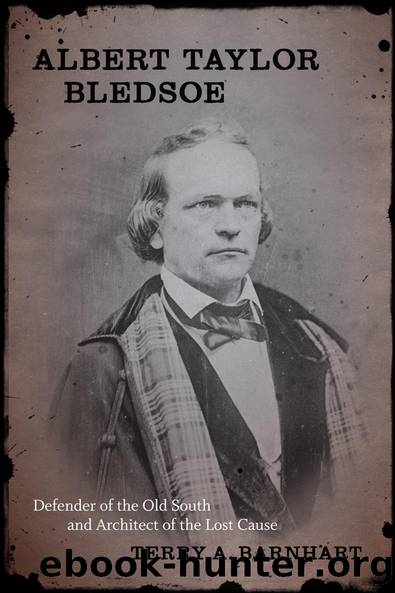Albert Taylor Bledsoe by Terry A. Barnhart

Author:Terry A. Barnhart [Barnhart, Terry A.]
Language: eng
Format: epub
Tags: History, United States, State & Local, South (AL; AR; FL; GA; KY; LA; MS; NC; SC; TN; VA; WV), Civil War Period (1850-1877), Political Science, General
ISBN: 9780807139400
Google: XurGlP_UjdQC
Publisher: LSU Press
Published: 2011-06-10T00:42:26+00:00
8
WRITING THE REVOLUTION
A Confederate Interpretation of the Civil War
BLEDSOE BEGAN HIS LITERARY mission for the Confederacy soon after his return to Charlottesville. When George Frederick Holmes dined at Bledsoeâs home on the evening of November 13, 1862, Bledsoe read him the introduction to a manuscript entitled âThe Fall of the American Union.â Holmes observed in an entry to his diary that âhe opens his subject with great vigorâ but made no further comment.1 A portion of Bledsoeâs âFall of the American Unionâ manuscript subsequently appeared as âReflections on the Warâ in the Army and Navy Messenger on July 1, 1863. The Army and Navy Messenger was a semimonthly newspaper published in Petersburg, Virginia, by the Evangelical Tract Society.2 The primary purpose of the Messenger was to promote the morale and spiritual well-being of Confederate soldiers and sailors in the face of disheartening realities. The role of religion in maintaining the motivation of Confederate fighting forces was most important. It was part of a self-conscious effort to promote the development of Confederate nationalism.3 Home fires needed tending on both sides during the war, but creating and sustaining Confederate nationalism presented its own challenges.4 Bledsoeâs fugitive literary offerings on the war, first at home and then in the London press, represented one such effort.
âReflections on the Warâ is the earliest known expression of Bledsoeâs Confederate nationalism. It was a message he refined throughout the war and adamantly defended afterward.5 When he first began to examine the deteriorating condition of the country, it was the slavery controversy that appeared to him to be the most profound cause of the nationâs troubles. After further research and reflection, however, he concluded that slavery was a powerful yet âa very subordinateâ cause of the difficulties that eventually led to secession and war. The history of the Republic, said Bledsoe, revealed an earlier struggle between the North and South than that which roiled the Republic over the slavery issue. It was a rivalry for political dominance within the new Union that figured prominently in the Constitutional Convention of 1787. Antagonism between the two rival sections ultimately centered on the issues of protective tariffs and the perpetuation of the institution of slavery, but the lineaments of distrust between the North and the South had been present at the very birth of the Republic itself. Bledsoe supposed at the time he began his historical investigations that he had gone to the bottom of his subject and had perceived the origins of âthe present revolutionâ quite clearly. He now declared himself to have been gravely mistaken.
The true causes of the Confederate revolution, Bledsoe declared, ranged far beyond the slavery controversy. They were âas deep as the foundations of society itself, and as universal as the interests of humanity.â Bledsoe saw the history of humankind as essentially a struggle of one portion of the species to subjugate and rule another, and the corresponding struggle of the oppressed portion of humanity to maintain its independence. The aptness of that thesis to the slavery controversy could not have escaped him.
Download
This site does not store any files on its server. We only index and link to content provided by other sites. Please contact the content providers to delete copyright contents if any and email us, we'll remove relevant links or contents immediately.
| Afghan & Iraq Wars | American Civil War |
| American Revolution | Vietnam War |
| World War I | World War II |
Waking Up in Heaven: A True Story of Brokenness, Heaven, and Life Again by McVea Crystal & Tresniowski Alex(37811)
Empire of the Sikhs by Patwant Singh(23086)
We're Going to Need More Wine by Gabrielle Union(19046)
Hans Sturm: A Soldier's Odyssey on the Eastern Front by Gordon Williamson(18592)
Leonardo da Vinci by Walter Isaacson(13336)
The Radium Girls by Kate Moore(12028)
Tools of Titans by Timothy Ferriss(8396)
Educated by Tara Westover(8054)
How to Be a Bawse: A Guide to Conquering Life by Lilly Singh(7486)
Permanent Record by Edward Snowden(5847)
The Last Black Unicorn by Tiffany Haddish(5635)
The Rise and Fall of Senator Joe McCarthy by James Cross Giblin(5280)
Promise Me, Dad by Joe Biden(5153)
The Wind in My Hair by Masih Alinejad(5095)
A Higher Loyalty: Truth, Lies, and Leadership by James Comey(4964)
The Crown by Robert Lacey(4817)
The Iron Duke by The Iron Duke(4356)
Joan of Arc by Mary Gordon(4110)
Stalin by Stephen Kotkin(3965)
